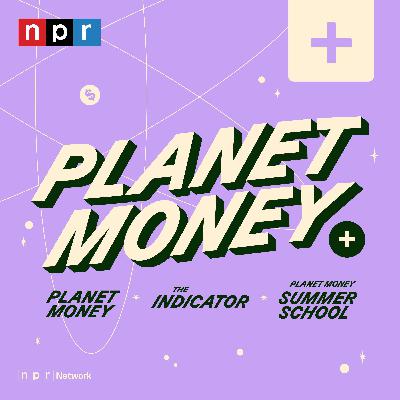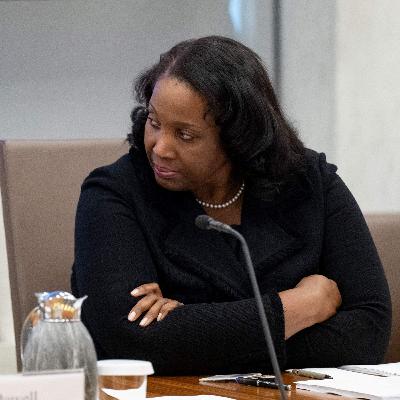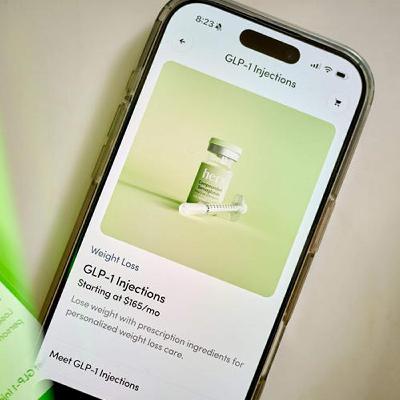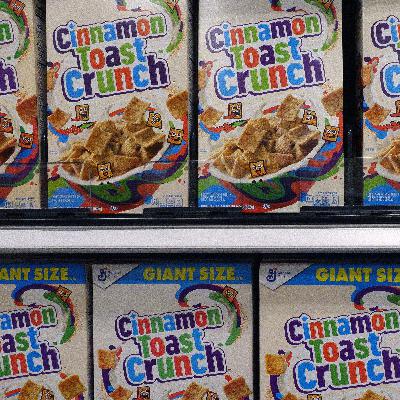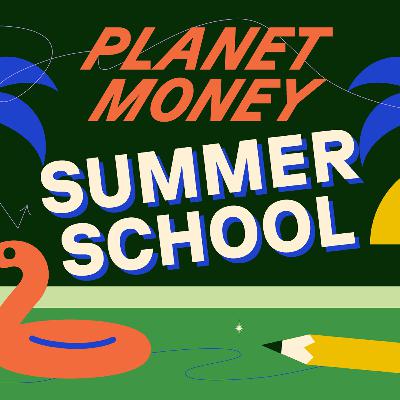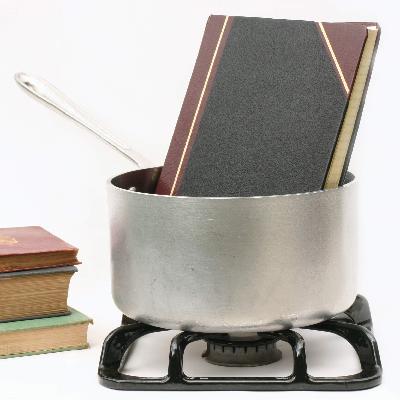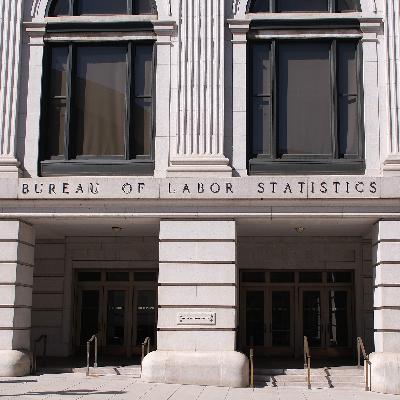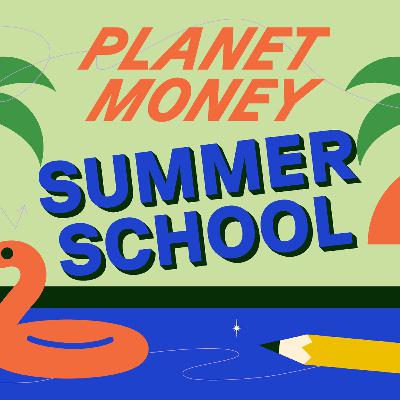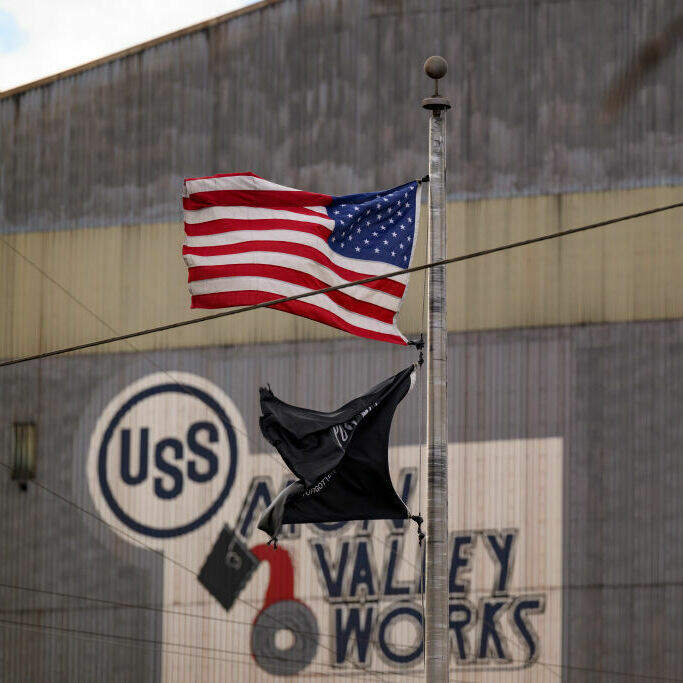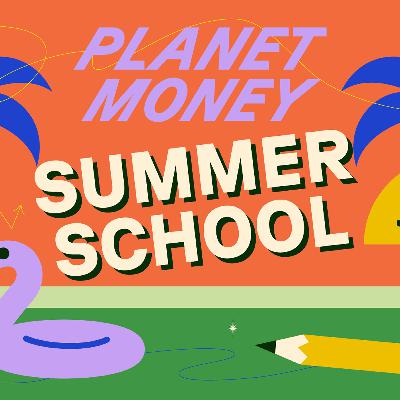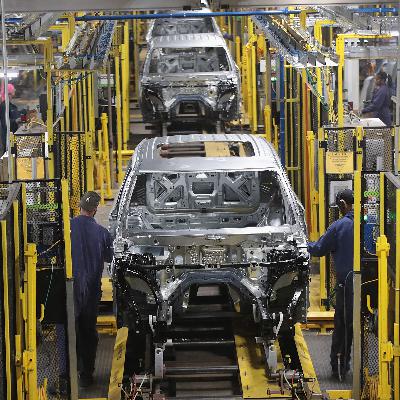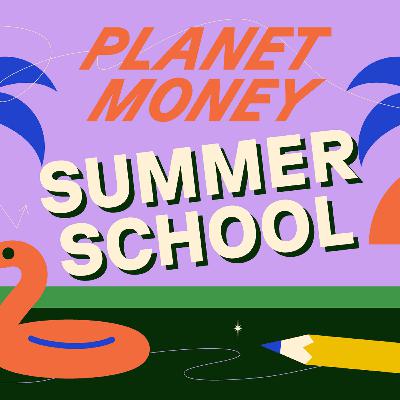Discover Planet Money Plus
Planet Money Plus

Planet Money Plus
Author: NPR
Subscribed: 30Played: 525Subscribe
Share
© Copyright 2015-2021 NPR - For Personal Use Only
Description
Wanna see a trick? Give us any topic and we can tie it back to the economy. At Planet Money, we explore the forces that shape our lives and bring you along for the ride. Don't just understand the economy – understand the world.
Wanna go deeper? Subscribe to Planet Money+ and get sponsor-free episodes of Planet Money, The Indicator, and Planet Money Summer School. Plus access to bonus content. It's a new way to support the show you love. Learn more at plus.npr.org/planetmoney
Wanna go deeper? Subscribe to Planet Money+ and get sponsor-free episodes of Planet Money, The Indicator, and Planet Money Summer School. Plus access to bonus content. It's a new way to support the show you love. Learn more at plus.npr.org/planetmoney
532 Episodes
Reverse
When we stumbled upon Milk.com, we were mystified. It appears to be someone’s personal website. But memorable domain names can be worth a million dollars or more. So, why is someone using this valuable internet real estate to post their resume and favorite recipes? Back in the internet’s early days, it was easy to get a domain name. They were cheap or even free. The first people to grab them may now be holding onto assets that can sell for millions of dollars. These potential profits have attracted a unique breed of investor who buys and sells domain names, gambling on the value of everyday words. On our latest show: What is a domain really worth? And we ask the owner of milk.com why he’s not selling — and if there’s a price that might change his mind.Planet Money is writing a book! Sign up for updates about pre-sale special gifts and for book tour events.Subscribe to Planet Money+Listen free: Apple Podcasts, Spotify, the NPR app or anywhere you get podcasts.Facebook / Instagram / TikTok / Our weekly Newsletter.This episode was hosted by Alex Mayyasi and Jeff Guo. It was produced by Willa Rubin and edited by Jess Jiang. It was fact-checked by Sierra Juarez and engineered by James Willetts. Alex Goldmark is Planet Money's executive producer.Learn more about sponsor message choices: podcastchoices.com/adchoicesNPR Privacy Policy
Ahead of a new monthly jobs report later this week (and on this Labor Day!), we're sharing an extended conversation between Darian Woods and former Bureau of Labor Statistics commissioner, William Beach. In this bonus episode, they talk about how the jobs numbers are collected and how revisions work (particularly his reaction to the large revision we recently got). We also get his reaction to the firing of Erika McEntarfer. She served as BLS commissioner until President Trump fired her last month, accusing McEntarfer of "rigging" the jobs numbers. Show your support for Planet Money and the reporting we do by signing up for Planet Money+ in Apple Podcasts or at plus.npr.org. You'll be able to unlock this episode and other great bonus content! Regular episodes remain free to listen! Email the show at planetmoney@npr.org. Learn more about sponsor message choices: podcastchoices.com/adchoicesNPR Privacy Policy
The Federal Reserve has been under intense pressure from President Donald Trump as he pushes for more control over the historically independent agency. The Fed is tasked with keeping inflation and unemployment under control, and it’s supposed to be insulated from politics so it can do whatever is necessary for the economy. But Trump has been openly saying he wants interest rates to be lower. A lot lower.And on Monday, Trump posted a bombshell. He said that he was removing Federal Reserve governor Lisa Cook, “for cause.” Lisa Cook has told NPR she intends to remain in office, and is now suing Trump. On today’s show: inside the Fed Board of Governors. How realistic is a plan to control monetary policy through loyalists on the Board? We hear from former Board governors to understand what the job is, and what we might be in for. Further listening on the Fed and Fed independence: - A primer on the Federal Reserve's independence - Happy Fed Independence Day - The case for Fed independence in the Nixon tapes - A Locked Door, A Secret Meeting And The Birth Of The Fed - Trump's unprecedented attack on the Fed - Turkey's runaway inflation problem - Should presidents have more of a say in interest rates?Listen free at these links: Apple Podcasts, Spotify, the NPR app or anywhere you get podcasts.Find more Planet Money: Facebook / Instagram / TikTok / Our weekly Newsletter.Help support Planet Money and hear our bonus episodes by subscribing to Planet Money+ in Apple Podcasts or at plus.npr.org/planetmoney.Learn more about sponsor message choices: podcastchoices.com/adchoicesNPR Privacy Policy
Get your own personalized summer school diploma here.Today on our final episode of Summer School 2025, we will test your knowledge. We will salute the unsung heroes of government service. And we will pick our valedictorian from among you of the class of 2025. Editorial Note:President Trump attempted to fire Lisa Cook, a Biden appointee to the Federal Reserve Board. Our daily podcast, The Indicator, has coverage on their latest episode. We’ll have an episode in the Planet Money feed soon, in the meantime, here’s some background listening on why this is so important. Years before she joined the Fed, we profiled the work of Lisa Cook. Listen here.Also these: Happy Fed Independence DayA primer on the Federal Reserve's independenceThe case for Fed independence in the Nixon tapesTurkey's runaway inflation problem Arthur Burns: shorthand for Fed failure? Should presidents have more of a say in interest rates?Can the Federal Reserve stay independent? It's hard out there for a Fed chair The series is hosted by Robert Smith and produced by Eric Mennel. Our project manager is Devin Mellor. This episode was edited by Planet Money Executive Producer Alex Goldmark and fact-checked by Emily Crawford.Always free at these links: Apple Podcasts, Spotify, the NPR app or anywhere you get podcasts.Find more Planet Money: Facebook / Instagram / TikTok / Our weekly Newsletter.Help support Planet Money and hear our bonus episodes by subscribing to Planet Money+ in Apple Podcasts or at plus.npr.org/planetmoney.Learn more about sponsor message choices: podcastchoices.com/adchoicesNPR Privacy Policy
In the past couple years, demand has gone wild for drugs like Ozempic – and its cousins, Zepbound, Wegovy, and Mounjaro. For people who had never been able to lose weight before, suddenly the numbers on the scale were plummeting. And everybody wanted to get their hands on them. Now, in most industries, if a product goes viral like this, it’s a golden ticket. And thanks to government-granted monopolies designed to encourage innovation, the big drug companies behind these blockbuster injections are currently the only ones allowed to make them.In theory, anyway. But, what if that explosive demand backfired, opening the door to legal knock-offs? You’ve maybe seen them - copycats advertised as the same thing as Ozempic. So, what’s the difference? And just how legal are they? On today’s show - a drug that’s changing people's lives is also challenging the traditional way we buy and sell medicine.This episode was hosted by Sydney Lupkin and Jeff Guo. It was produced by James Sneed. It was edited by Marianne McCune, fact-checked by Sierra Juarez, and engineered by Gilly Moon and Debbie Daughtry. Alex Goldmark is Planet Money’s executive producer.Listen free at these links: Apple Podcasts, Spotify, the NPR app or anywhere you get podcasts.Find more Planet Money: Facebook / Instagram / TikTok / Our weekly Newsletter.Help support Planet Money and hear our bonus episodes by subscribing to Planet Money+ in Apple Podcasts or at plus.npr.org/planetmoney.Music: Source Audio - “Subtly Silly Thug,” “Got The Moves,” and “Vive le Punk”Learn more about sponsor message choices: podcastchoices.com/adchoicesNPR Privacy Policy
Tariffs are the favorite tool of our current president, but there are lots of other ways that governments insert themselves into the free exchange of goods and services. Some of these trade barriers are so insidious and have been going on for so long that it may surprise you that they even exist. We bring you the classic story of what happens when you try to protect an American industry and end up hurting another American industry. Well intentioned plans turn into trade barriers that make our lives more expensive. Check out our Summer School video cheat sheet TikTok. Help support Planet Money and hear our bonus episodes by subscribing to Planet Money+ in Apple Podcasts or at plus.npr.org/planetmoney. Always free at these links: Apple Podcasts, Spotify, the NPR app or anywhere you get podcasts. Find more Planet Money: Facebook / Instagram / TikTok / Our weekly Newsletter. The series is hosted by Robert Smith and produced by Eric Mennel. Our project manager is Devin Mellor. This episode was edited by Planet Money Executive Producer Alex Goldmark and fact-checked by Emily Crawford. Learn more about sponsor message choices: podcastchoices.com/adchoicesNPR Privacy Policy
For today’s bonus episode, we’re squeezing in an extra lesson of Summer School before commencement next week! Robert Smith talks with Joan Ricart-Huguet, an associate professor at Loyola University Maryland, about some of the ideas we couldn’t get to this season. We hear how politicians craft an economy to get reelected, how friends may be the secret to economic growth, and the trade-offs that come with large nations. (You can also credit Joan for writing in and encouraging us to do a Summer School season on the economics of government!) Show your support for Planet Money and the reporting we do by signing up for Planet Money+ in Apple Podcasts or at plus.npr.org. You'll be able to unlock this episode and other great bonus content! Regular episodes remain free to listen! Email the show at planetmoney@npr.org. Learn more about sponsor message choices: podcastchoices.com/adchoicesNPR Privacy Policy
For most Americans, we just lived through the highest period of inflation in our lives. And we are reminded of this every time we go grocery shopping. All over TikTok, tons of people have posted videos of how little they got for… $20. $40. $100. Most upsetting to us: an $8 box of Cinnamon Toast Crunch.Food prices are almost 30% higher than they were five years ago. It’s bad. And those new, higher prices aren’t going away.At the same time, prices are no longer inflating at a wild pace. For the last two years, the rate of inflation has slowed way down. And yet, our fears or feelings that things will spiral out of control again? Those have not slowed down.This mismatch has been giving us all the... feelings. Inflation feelings. Infeelings. On our latest show: we sort through our infeeltions. We talk to the economists who have studied us. We learn why our personal inflation calculators don’t always match the professional ones.Listen free at these links: Apple Podcasts, Spotify, the NPR app or anywhere you get podcasts.Find more Planet Money: Facebook / Instagram / TikTok / Our weekly Newsletter.Support Planet Money, get bonus episodes and sponsor-free listening and now Summer School episodes one week early by subscribing to Planet Money+ in Apple Podcasts or at plus.npr.org/planetmoney.Learn more about sponsor message choices: podcastchoices.com/adchoicesNPR Privacy Policy
In economics, a market is a place (even virtual) where buyers and sellers meet to exchange goods or services. Economists love markets. It's like all of our supply and demand graphs have come to life. Almost everything you buy goes through some sort of marketplace—your cup of coffee came from trading in the bean markets. Your spouse might have come from the dating marketplace on the apps. Even kids will tell you one Snickers is worth at least two Twix.But sometimes, as we'll see today, markets can go terribly wrong; greed can run out of control; lives can be at risk. That's when the government often steps in and gives the market a little nudge to work better. Today's episode: Market Design.The series is hosted by Robert Smith and produced by Eric Mennel. Our project manager is Devin Mellor. This episode was edited by Planet Money Executive Producer Alex Goldmark and fact-checked by Emily Crawford. Help support Planet Money and hear our bonus episodes by subscribing to Planet Money+ in Apple Podcasts or at plus.npr.org/planetmoney.Always free at these links: Apple Podcasts, Spotify, the NPR app or anywhere you get podcasts.Find more Planet Money: Facebook / Instagram / TikTok / Our weekly Newsletter.Learn more about sponsor message choices: podcastchoices.com/adchoicesNPR Privacy Policy
After President Trump fired the head of the Bureau of Labor Statistics, economists and statisticians across the board were horrified. Because the firing raises the spectre of potential manipulation – and it raises the worry that, in the future, the numbers won't be as trustworthy.So: we looked at two countries that have some experience with data manipulation. To ask what happens when governments get tempted to cook the books. And...once they cook the books... how hard is it to UN-cook them?It's two statistical historical cautionary tales. First, we learn how Argentina tried to mask its true inflation rate, and how that effort backfired. Then, we hear about the difficult process of cleaning up the post-cooked-book mess, in Greece. For more: - Can we just change how we measure GDP? - The price of lettuce in Brooklyn - What really goes on at the Bureau of Labor Statistics (Update) - Can we still trust the monthly jobs report? (Update) - How office politics could take down Europe - The amazing shrinking economy might stop shrinkingListen free at these links: Apple Podcasts, Spotify, the NPR app or anywhere you get podcasts.Find more Planet Money: Facebook / Instagram / TikTok / Our weekly Newsletter.Support Planet Money, get bonus episodes and sponsor-free listening and now Summer School episodes one week early by subscribing to Planet Money+ in Apple Podcasts or at plus.npr.org/planetmoney.Learn more about sponsor message choices: podcastchoices.com/adchoicesNPR Privacy Policy
LIVE SHOW: August 18th in Brooklyn. Tickets here. Traditional economics says the market is guided by the forces of supply and demand. Customers decide what they want to buy, and private enterprise responds to that need. So what makes government think that it's smarter than capitalism? Why offer tax breaks to Hollywood or incentives to build silicon chip factories in Arizona? Why those industries and not others? And when does the free market fail and need government to step in? Today, we discuss what happens when the government really wants to get its hands dirty and shape the direction of the economy, even decide which companies should prosper and which ones should fail, through industrial policy.The series is hosted by Robert Smith and produced by Eric Mennel. Our project manager is Devin Mellor. This episode was edited by Planet Money Executive Producer Alex Goldmark and fact-checked by Emily Crawford. Help support Planet Money and hear our bonus episodes by subscribing to Planet Money+ in Apple Podcasts or at plus.npr.org/planetmoney.Always free at these links: Apple Podcasts, Spotify, the NPR app or anywhere you get podcasts.Find more Planet Money: Facebook / Instagram / TikTok / Our weekly Newsletter.Learn more about sponsor message choices: podcastchoices.com/adchoicesNPR Privacy Policy
Trust in experts is down. In all kinds of institutions and professions - in government, in media, in medical science... and lately, economists are feeling the burn acutely. In fact, President Trump just fired the economist who ran the Bureau of Labor Statistics, accusing her – with no evidence – of faking a jobs report that showed fewer gains than expected.In decades past, economists whispered in the ears of presidents. Now, many politicians and voters are disenchanted with the field.On today's show, we speak with economists about how distrust is messing with their minds and interfering with their work. Can they build up trust again?Today's episode was hosted by Amanda Aronczyk. It was produced by Sam Yellowhorse Kesler and edited by Marianne McCune with help from Jess Jiang. It was engineered by Robert Rodriguez and fact-checked by Sierra Juarez. Alex Goldmark is Planet Money's executive producer.Listen free at these links: Apple Podcasts, Spotify, the NPR app or anywhere you get podcasts.Find more Planet Money: Facebook / Instagram / TikTok / Our weekly Newsletter.Support Planet Money, get bonus episodes and sponsor-free listening and now Summer School episodes one week early by subscribing to Planet Money+ in Apple Podcasts or at plus.npr.org/planetmoney.Learn more about sponsor message choices: podcastchoices.com/adchoicesNPR Privacy Policy
LIVE SHOW: August 18th in Brooklyn. Tickets here. There are occasional incentives in business that make it very profitable to do bad things; maybe cheat at the game and steal other people's ideas, or cut some corners on safety. In theory, the government as referee steps in to make the rules and enforce them, and manage competition in a way that hopefully makes things better for us all. But you have to ask... When is the government protecting you and when is it protecting the already rich and powerful?We'll meet a man trying to corner the market for frozen meat, with the help of patents. And then we'll head to the salon, and ask — Should the government really require dozens of hours of training for a license to braid hair? Get tickets to our August 18th live show and graduation ceremony at The Bell House, in Brooklyn. (Planet Money+ supporters get a 10 percent discount off their tickets. Listen to the July 8th bonus episode to get the code!) The series is hosted by Robert Smith and produced by Eric Mennel. Our project manager is Devin Mellor. This episode was edited by Planet Money Executive Producer Alex Goldmark and fact-checked by Sofia Shchukina. Help support Planet Money and hear our bonus episodes by subscribing to Planet Money+ in Apple Podcasts or at plus.npr.org/planetmoney.Learn more about sponsor message choices: podcastchoices.com/adchoicesNPR Privacy Policy
LIVE SHOW ALERT: August 18th, NYC. Get your tickets here. When news broke that a Japanese company, Nippon Steel, was buying the storied American steel company U.S. Steel, it was still 2023, just before an election. And right away, politicians from both sides of the aisle came out forcefully against the deal, saying the company should remain American. Before leaving office, President Biden even blocked the sale. But in a dramatic twist a few weeks ago, President Trump approved it. With a caveat: the U.S. would get what Trump called 'a golden share' in U.S. Steel.On our latest show: what even is a "golden share"? When has it been used before, and why? And, could deals like this be a good way to get foreign investment in American manufacturing...or is it government overreach? Related episodes:- When Uncle Sam owned banks and factories- How Big Steel in the U.S. fellThis episode was produced by Willa Rubin and edited by Marianne McCune. Research help from Emily Crawford and Emma Peaslee. It was fact-checked by Sierra Juarez and engineered by Robert Rodriguez. Alex Goldmark is our executive producer.Support Planet Money, get bonus episodes, sponsor-free listening and now Summer School episodes one week early by subscribing to Planet Money+ in Apple Podcasts or at plus.npr.org/planetmoney.Listen free at these links: Apple Podcasts, Spotify, the NPR app or anywhere you get podcasts.Find more Planet Money: Facebook / Instagram / TikTok / Our weekly Newsletter.Learn more about sponsor message choices: podcastchoices.com/adchoicesNPR Privacy Policy
Although it seems like the government can spend an endless amount of money, it cannot actually do all the things it wants to do. So the big question in this week's lesson is: How do we decide? Why does the government spend so much money on some things and not on others? And honestly, is there any limit?Get tickets to our August 18th live show and graduation ceremony at The Bell House, in Brooklyn. (Planet Money+ supporters get a 10 percent discount off their tickets. Listen to the July 8th bonus episode to get the discount code!)The series is hosted by Robert Smith and produced by Eric Mennel. Our project manager is Devin Mellor. This episode was edited by Planet Money Executive Producer Alex Goldmark and fact-checked by Emily Crawford.Help support Planet Money and hear our bonus episodes by subscribing to Planet Money+ in Apple Podcasts or at plus.npr.org/planetmoney.Always free at these links: Apple Podcasts, Spotify, the NPR app or anywhere you get podcasts.Find more Planet Money: Facebook / Instagram / TikTok / Our weekly Newsletter.Learn more about sponsor message choices: podcastchoices.com/adchoicesNPR Privacy Policy
It seems like politicians cannot agree on a lot. But many seem to agree on... manufacturing. Leaders of both political parties have been working to try and make the U.S. a manufacturing powerhouse again.On today's show, what is so special about manufacturing? Is it particularly important for the economy? And if manufacturing jobs are so great, then why have companies been struggling to fill the manufacturing jobs we already have?For more on manufacturing in the U.S: - Made in America, an episode about what manufacturing work in the U.S. can be like for garment workers and how much they're paid to make each piece of clothing "made in the U.S." - Why aren't Americans filling the manufacturing jobs we already have? - What makes manufacturing jobs special? The answer could help rebuild the middle class - Can bringing back manufacturing help the heartland catch up with 'superstar' cities? - And, for more, check out the Planet Money newsletter's manufacturing series at npr.org/manufacturing. Find more Planet Money: Facebook / Instagram / TikTok / Our weekly Newsletter.Listen free at these links: Apple Podcasts, Spotify, the NPR app or anywhere you get podcasts.Support Planet Money, get bonus episodes, sponsor-free listening, and now early access to new episodes of Summer School by signing up for Planet Money+ in Apple Podcasts or at plus.npr.org/planetmoney.Learn more about sponsor message choices: podcastchoices.com/adchoicesNPR Privacy Policy
Act now to ensure public media remains free and accessible to all. Your donation will help this essential American service survive and thrive. Visit donate.npr.org now.Learn more about sponsor message choices: podcastchoices.com/adchoicesNPR Privacy Policy
We all know the government uses taxes to pay for things. But what about using taxes to control behavior? This week on Summer School, Professor Darrick Hamilton of The New School, helps us explore the true power of the tax code. Can taxes help lift people out of poverty? What about saving the planet?Get tickets to our August 18th live show and graduation ceremony at The Bell House, in Brooklyn. (Planet Money+ supporters get a 10 percent discount off their tickets. Listen to the July 8th bonus episode to get the discount code!)The series is hosted by Robert Smith and produced by Eric Mennel. Our project manager is Devin Mellor. This episode was edited by Planet Money Executive Producer Alex Goldmark and fact-checked by Emily Crawford and Sierra Juarez. Engineering by Robert Rodriguez.Always free at these links: Apple Podcasts, Spotify, the NPR app or anywhere you get podcasts.Find more Planet Money: Facebook / Instagram / TikTok / Our weekly Newsletter.Help support Planet Money and hear our bonus episodes by subscribing to Planet Money+ in Apple Podcasts or at plus.npr.org/planetmoney.Learn more about sponsor message choices: podcastchoices.com/adchoicesNPR Privacy Policy
What people might picture when they think of "Made in America" ... might not look like the "Made in America" we have today.The U.S. does have a domestic manufacturing industry, including a garment manufacturing industry. In today's episode: We buy a garment made by factory workers in the U.S. – a basic purple sports bra – and learn how many people it took to make it, how much workers got paid to work on it ... and whether garment manufacturing is a job Americans want, or even know how, to do. Plus: why domestic garment manufacturing exists at all in the U.S., and whether the industry can grow.Other episodes: - What "Made in China" actually meansThis episode was reported and hosted by Sarah Gonzalez. It was produced by Willa Rubin with production help from Emma Peaslee. It was edited by Marianne McCune, and it was fact-checked by Sierra Juarez who also helped with research. It was engineered by Robert Rodriguez. Alex Goldmark is our executive producer.Support Planet Money, get bonus episodes and sponsor-free listening and now Summer School episodes one week early by subscribing to Planet Money+ in Apple Podcasts or at plus.npr.org/planetmoney.Find more Planet Money: Facebook / Instagram / TikTok / Our weekly Newsletter.Listen free at these links: Apple Podcasts, Spotify, the NPR app or anywhere you get podcasts.Help support Planet Money and hear our bonus episodes by subscribing to Planet Money+ in Apple Podcasts or at plus.npr.org/planetmoney.Learn more about sponsor message choices: podcastchoices.com/adchoicesNPR Privacy Policy
Government. The Big G. We like to imagine the free market and the invisible hand as being independent from political influence. But Nobel laureate, Simon Johnson, says that influence has been there since the birth of economics. Call it political economy. Call it government and business. Call it our big topic each Wednesday through Labor Day. We're kicking off another semester of Planet Money Summer School asking the biggest question: Why are some nations rich and others poor? With stories from India, New York City and Peru, we look at the ways in which government bureaucracy can help make or break an economy. Tickets for Planet Money Live at the Bell House available here. Planet Money+ supporters get a 10 percent discount off their tickets. Go to plus.npr.org to sign up, if you haven't already, and listen to the July 8th bonus episode to get the discount code.Always free at these links: Apple Podcasts, Spotify, the NPR app or anywhere you get podcasts.Find more Planet Money: Facebook / Instagram / TikTok / Our weekly Newsletter.Planet Money+ supporters get early access to new episodes of Summer School this season! You also get sponsor-free listening, regular bonus episodes, and you'll help support the work of Planet Money. Sign up for Planet Money+ in Apple Podcasts or at plus.npr.org/planetmoney. Learn more about sponsor message choices: podcastchoices.com/adchoicesNPR Privacy Policy
Comments
 United States
United States


